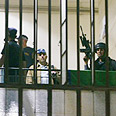
Israel indicates willingness to continue peace talks despite attack
Peace talks to go 'so as not to punish moderate Palestinians' according to Israeli official. Hamas, Islamic Jihad explore possibility of Egypt-brokered truce. Closure remains in effect on West Bank
Outside the bullet-scarred seminary, thousands of mourners marched in funeral processions Friday for the eight young students gunned down by a 25-year-old Palestinian from east Jerusalem whose family said he had been distraught over this week's carnage in the Gaza Strip.
A rabbi at the seminary, which is a flagship of Israel's West Bank settlement movement, recited Hebrew psalms that the crowd repeated. The bodies were taken away for burial. One of the dead students was 26; the rest were between 15 and 19.
Concerned about more violence, Israel slapped a closure on the West Bank and kept men under 45 from praying at Jerusalem's main mosque.
And in a possible sign that Israel suspects Lebanese guerrillas could have been involved, Israel sent warplanes over Beirut, according to a Lebanese security official. Israel's army declined comment.
Despite the bloodshed, an Israeli official said his country would not cut off peace talks with the moderate Palestinian leadership - an apparent nod to Washington's insistence that extremist violence not be allowed to derail efforts to forge a deal by year's end.
Israel will push ahead with the talks "so as not to punish moderate Palestinians for actions by people who are not just our enemies but theirs as well," said the official, speaking on condition of anonymity because the government had yet to make a formal announcement.
It was the second time in a month that Israel chose not to halt talks after an attack. When a Palestinian suicide bomber blew struck in the town of Dimona, killing one woman and wounding 11 people on Feb. 4, Israeli and Palestinian officials went ahead with a planned negotiating session.
Palestinian President Mahmoud Abbas briefly suspended talks this week after more than 120 Palestinians were killed in an Israeli campaign against Palestinian rocket launchers in Gaza. Abbas later backed down under pressure from US Secretary of State Condoleezza Rice.
Egypt, backed by the US, Is exploring a truce deal between Israel and Hamas that would stop rocket fire on Israel in exchange for an end to Israeli attacks on militants and the resumption of trade and travel from Gaza, where border crossings have been closed since Hamas violently seized control of the coastal strip in June.
Militants from Hamas and Islamic Jihad traveled from Gaza to the northern Egyptian city of el-Arish on Thursday to confer with senior Egyptian intelligence officials on a truce. US Assistant Secretary of State David Welch also was in Egypt.
The diplomacy appeared to reflect a growing understanding that a peace deal between Israel and Abbas' moderate government based in the West Bank will simply not be possible as long as Hamas is playing the role of spoiler in Gaza.
However, the latest violence undermined cease-fire hopes - and raised the possibility of more harsh Israeli action in Gaza, especially if Hamas indeed was behind the seminary attack.
Driver claims responsibility
Relatives of Alaa Abu Dheim of east Jerusalem said he had carried out the attack, and the family set up a mourning tent, and both Hamas and Hizbullah flags hung outside it. Neighbors said he had been a driver for the seminary.
It was not clear if any group provided backing for the shooting, and Israeli TV stations said security officials believed he may have acted alone. Hamas radio had said Friday the militant group took responsibility, but later retracted the report. Abu Obeida, a spokesman for Hamas' military wing, said the group was not yet taking official credit for the attack, adding to the confusion.
A previously unknown, Lebanese-based group, the "Martyrs of Imad Mughniyeh" - after a senior Hizbullah commander killed in Syria last month - claimed responsibility, the Al-Manar satellite TV station reported. But the claim could not be independently confirmed. Hizbullah has blamed Israel for Mughniyeh's assassination and vowed revenge.
Abu Dheim's relatives said they did not know of his plot, but were not surprised. He had been transfixed recently by the bloodshed in Gaza, and "he told me he wasn't able to sleep because of the grief," said his sister, Iman Abu Dheim.
Relatives described Abu Dheim as intensely religious, but said he was not a member of a militant group. Family members said several relatives had been taken for questioning by Israeli police.
Israeli Public Security Minister Avi Dichter said Arabs of east Jerusalem who have been involved in militant activity should be expelled to the West Bank, a move that would strip them of all their rights.
Mark Regev, a spokesman for Israeli Prime Minister Ehud Olmert, said the shooting had almost certainly been organized in the West Bank. But in a sign of the uncertainty over who was behind it, Regev did not point fingers.
He would not confirm that Israel had reached a decision to continue peace talks, but did not deny the other official's statement that negotiations would go on.










